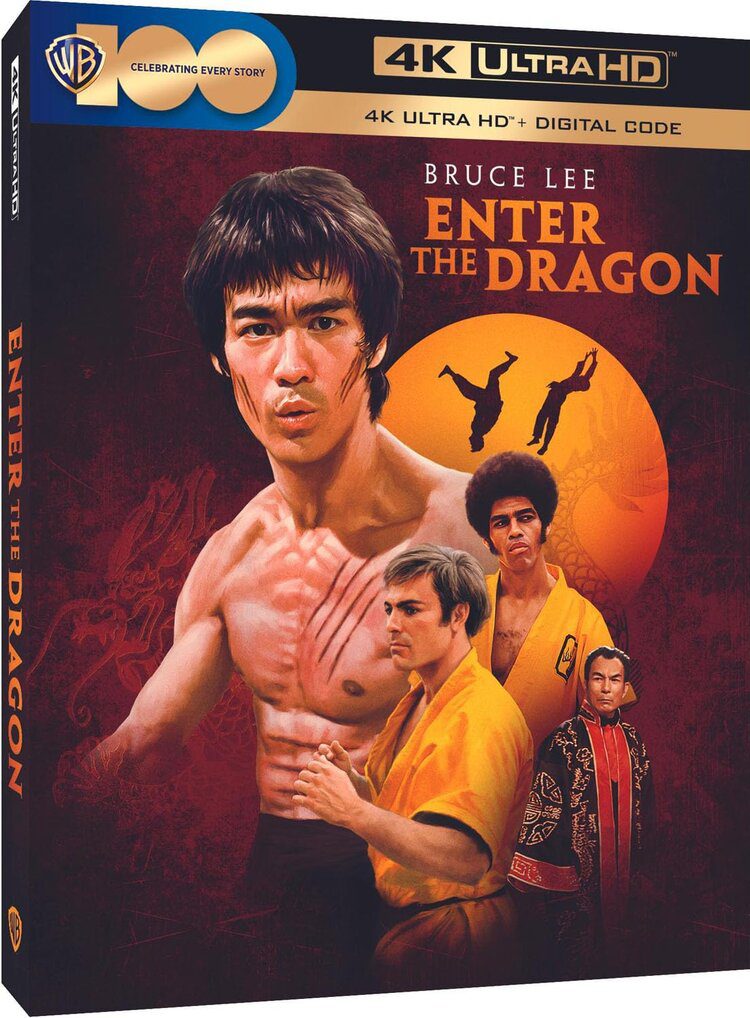
Enter the Dragon (1973; dir. Robert Clouse) is one of the most famous kung fu movies ever made. In the 50 years since its original theatrical release, its stature has only grown. Dragon was martial arts star Bruce Lee’s swan song—he died before it premiered—and it remains a fitting epitaph.
And the movie would suck a nunchuck through a garden hose were it not for Lee’s incredible, graceful athleticism.
Dragon was Hollywood’s first major bid to cash in on martial arts cinema (and if not, my research is crap). The film made Lee a star of the highest magnitude. To say he “wins” the film is a pitiful understatement. Lee is the movie.
So yes, I get a kick out of it. As a chop-socky spy actioner with hints of exploitation marbling the veneer, Dragon is by-turns fun, silly, boring, and rousing. You could say it’s a piece of shit (as director Quentin Tarantino has; but I know better than to circle that grenade), and you might be right. But… I’d argue Dragon knows it’s a schlocky, ridiculous mess. This doesn’t mean the movie is ironic because it’s not. That’s what I prize about it.
The plot: At the urging of British Intelligence, Lee (Lee), a badass martial arts instructor at the Shaolin Temple in Hong Kong, infiltrates a martial arts tournament on a remote island fortress that belongs to Han (Shih Kien, voice dubbed by Keye Luke). Han’s bodyguard (Bob Wall) drove Lee’s sister to suicide, before he could rape her—and Han, suspected of drug trafficking and prostitution, is one bad (yet unimposing) wretch himself. (For added effect, Han has an iron claw for a hand.) As cover for nabbing evidence against Han, Lee poses by day as a student enrolled in the tournament. By night, he sneaks around, trying to keep a low profile. Which—if you’re Bruce Lee, slapping snakes around like you’re dribbling basketballs—is not going to work. And it doesn’t. Along with two other students (Roper [John Saxon, whose toupee also came to play], a degenerate gambler and martial artist; and Williams [Jim Kelly], a martial arts stud and Roper’s Vietnam War bud), Lee gets into some deep dung before he and Han face off in a room full of mirrors.
Juicy stuff, huh?
Even if you can’t shelve your grumps about the movie’s silliness—but you do give yourself over to Lee’s charisma and the indelible fight scenes (which he choreographed)—you can view Dragon as an entertaining relic. I love the original Bob Peak poster for the film, the Asiatic jazz-funk mélange of the Lalo Schifrin soundtrack. I also dig the Saul Bass-designed Warner Bros. logo at the start of the film. Sure, the backstory cram before its characters land at Chez Han is wonky. The dubbed dialogue, a staple of martial arts cinema, is also off-putting—yet only at first. I tell myself to view some of these elements as notes of flavor, as part of the movie’s unintentional satire. And it’s exciting. (Especially when you compare it to “A Fistful of Yen”—the short film-within-a-film of The Kentucky Fried Movie [1977] that spoofs Dragon—Enter the Dragon plays as perhaps the greatest satire of itself ever made.)
The movie aims to turn Lee into a star, in a quirky and endearing way.
And Lee crushes it. Director Clouse keeps the plot points pumping. The brazen attempt by Warner Bros. to make Dragon an on-trend hit—a splashdown for Lee, who’d toiled in the Hollywood vineyard for years (as coach-of-the-stars, as Kato on the Green Hornet TV show) before he gained wider notice in a few Asian cheapies that (for my money) can’t hold a candle to Enter the Dragon—pays off. Big time. Just when the movie yawns, Lee zips in to snap it awake.
I shan’t go into the influence Enter the Dragon had on the many cultural artifacts that followed in its wake. I’ll close by saying this: Death robbed Lee of many things, including the chance to surpass the showcase this movie was. Would he have topped it? We’ll, of course, never know.
In Enter the Dragon, though, he lives.
Re-released to help commemorate Warner Bros.’s 100th anniversary and the film’s 50th, Enter the Dragon in 4K UHD looks just as good as expected. The single disc in the package has both the 99-minute theatrical version, and a previously released special edition with three more minutes of footage. The 4K release also gives you digital access to the film. I welcome the slight grain of the 4K transfer. Even if it wasn’t part of the film’s original intended aesthetic (i.e., jumped-up grindhouse), it fits. My only quibble is the lack of special features. You get an intro by Lee’s widow, Linda Lee Cadwell, for the special edition, and audio commentary by co-producer Paul Heller and screenwriter Michael Allin.